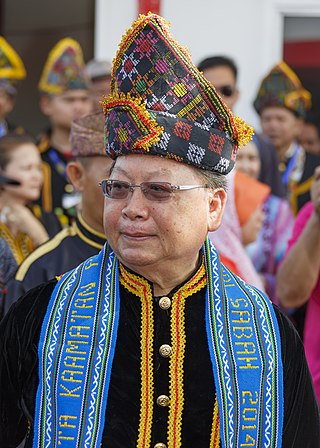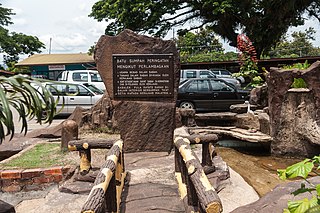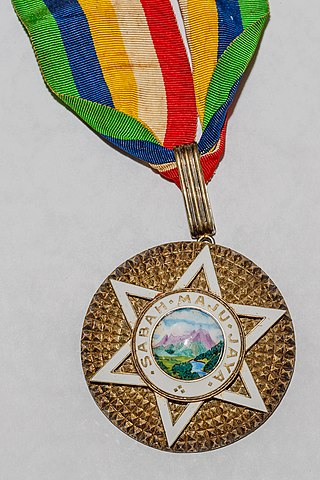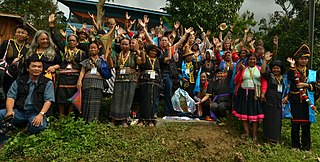
Keningau is the capital of the Keningau District in the Interior Division of Sabah, Malaysia. It is the fifth-largest town in Sabah, as well one of the oldest. Keningau is between Tambunan and Tenom. The town had an estimated population of 173,130. Dusuns, Muruts and Lundayehs is the major ethnics in Keningau.

Kadazandusun are the largest ethnic group in Sabah, Malaysia, an amalgamation of the closely related indigenous Kadazan and Dusun peoples. "Kadazandusun" is an umbrella term that encompasses both the Kadazan and Dusun peoples. They are also known as Mamasok Sabah, meaning "indigenous people of Sabah". Kadazandusun tradition holds that they are the descendants of Nunuk Ragang. Kadazandusun is recognised as an indigenous nation of Borneo with documented heritage by the United Nations Educational, Scientific and Cultural Organization (UNESCO) since 2004. Kadazandusuns are part of the bumiputera in Malaysia having been endowed with rights concerning land, rivers, education and maintaining their own customary laws.

Tan Sri Datuk Seri Panglima Joseph Pairin Kitingan is a Malaysian politician who served as the 7th Chief Minister of Sabah from April 1985 to March 1994 and Member of Parliament (MP) for Keningau from August 1986 to May 2018. He is founding President of the United Sabah Party (PBS) and brother of Jeffrey Kitingan, the Deputy Chief Minister II and State Minister of Agriculture and Fisheries of Sabah and President of Homeland Solidarity Party (STAR) as well as uncle of Maximus Ongkili, the Minister in the Prime Minister's Department in charge of Sabah and Sarawak affairs and President of PBS. He is the longest-serving MP in Sabah.

Datuk Seri Panglima Dr. Maximus Johnity Ongkili is a Malaysian politician who has served as Chairman of the Energy Commission of Sabah (ECOS) since February 2023. He served as Minister in the Prime Minister's Department for Sabah and Sarawak Affairs for the second term in the Barisan Nasional (BN) administration under former Prime Minister Ismail Sabri Yaakob from August 2021 to the collapse of the BN administration in November 2022, the first term in the Perikatan Nasional (PN) administration under former Prime Minister Muhyiddin Yassin from March 2020 to August 2021 as well as for National Unity and Integration in the Barisan Nasional (BN) administration under former Prime Minister Abdullah Ahmad Badawi from March 2004 to March 2008 and the Minister of Energy, Green Technology and Water in the BN administration under former Prime Minister Najib Razak from May 2013 to May 2018, Member of Parliament (MP) for Kota Marudu from March 2004 to November 2022 and for Bandau from April 1995 to March 2004. He is the 2nd President and a member of the United Sabah Party (PBS), a component party of the Sabah People's Alliance (GRS).

Muhammad Fuad Stephens, was a Malaysian politician who served as the 1st and 5th Chief Minister of Sabah from September 1963 to December 1964 and again briefly from April 1976 to his death in June 1976, 3rd Yang di-Pertua Negara of Sabah from September 1973 to July 1975, 6th High Commissioner of Malaysia to Australia from 1968 to 1973. In addition, he also served as the 1st Huguan Siou or Paramount Leader of the Kadazandusun community. He played a role in bringing Sabah into the Federation of Malaysia in 1963. While he was initially against the idea of Sabah joining in the Federation, given British concerns about the stability of the region and their move to relinquish all their colonies in the post WWII era, he was gradually convinced to work towards it. He held the chief minister's post from 16 September 1963 until 31 December 1964 when he was forced to resign; and again in 1976 for 54 days from 15 April.
Tan Sri Dato' Harris bin Mohd Salleh is a Malaysian politician who served as the 6th Chief Minister of Sabah from June 1976 to April 1985. During his tenure, he ceded the island of Labuan, which used to be part of the state of Sabah, to the federal Government, making it the second federal territory of Malaysia. He was also the founding President of the Sabah People's United Front (BERJAYA).

Datuk Seri Panglima Dr Jeffrey Gapari Kitingan(born 22 October 1948, also known as DDJK or DSPDJK since 2021) is Malaysian politician who has served as the Deputy Chief Minister of Sabah I since January 2023 and State Minister of Agriculture and Fisheries of Sabah for the second term since September 2020. He served as the Deputy Chief Minister of Sabah II from October 2020 to his promotion in January 2023 and the first term in the position in May 2018. In January 2023, he was appointed as the Deputy Chief Minister I of Sabah succeeding Bung Mokhtar, who was dropped due to a political crisis. At the federal level, he served as the Deputy Minister of Tourism, Arts and Culture from March 2020 to his resignation in September 2020 and Deputy Minister of Housing and Local Government from August 1994 to May 1995. He has served as Member of Parliament (MP) for Keningau since May 2018, Member of the Sabah State Legislative Assembly (MLA) for Tambunan since May 2018 and Bingkor from 1994 to 2004 and again from May 2013 to May 2018. He has served and been founding President of the Homeland Solidarity Party (STAR), a component party of the ruling Gabungan Rakyat Sabah (GRS) and a former component party of the federal and state ruling Perikatan Nasional (PN) coalition, since July 2016.
Datuk Seri Panglima Stephen Robert Evans (1935–2017) SPDK, JP was a politician, public administrator and author from Sabah, Malaysia.

Datu Mustapha bin Datu Harun, or Tun Mustapha for short, was a Malaysian politician who served as the 3rd Chief Minister of Sabah from May 1967 to November 1975 and the 1st Yang Di-Pertua Negara from September 1963 to September 1965 and President of the United Sabah National Organisation (USNO). He was an important party in the negotiations leading to the formation of Malaysia on 16 September 1963.

The United Pasok Nunukragang National Organisation was a regional political party in Malaysia based in the state of Sabah. It was established in 1978. Before its deregistration, it was the oldest political party in Sabah that was currently still in existence. Despite being a party that maintains a Kadazan-Dusun ethnocentric platform, membership is opened to all ethnicities and the party's leadership has multi-ethnic representation.
Datuk Seri Panglima Wilfred Bumburing is a Malaysian politician who served as the Deputy Chief Minister of Sabah and Member of the Sabah State Legislative Assembly (MLA) for Tamparuli from 1985 to 1999 and again from May 2013 to May 2018, Member of Parliament (MP) for Tuaran from March 2008 to May 2013.

The Keningau Oath Stone is a monument in Keningau, Sabah which was specially erected to commemorate the merger of the British Crown Colony of North Borneo with the former colony of Sarawak and states of the Federation of Malaya to form Malaysia.

Datuk Seri Panglima Md Salleh bin Md Said, commonly known as Salleh Said Keruak, is a Malaysian politician who has served as Member of the Sabah State Legislative Assembly for Usukan from February 1994 to March 2004, from May 2013 to May 2018 and again since September 2020. He served as the Minister of Communications and Multimedia in the Barisan Nasional (BN) administration under former Prime Minister Najib Razak from July 2015 to the collapse of the BN administration in May 2018, 9th Chief Minister of Sabah from December 1994 to May 1996, Speaker of the Sabah State Legislative Assembly from December 2010 to July 2015, Senator from July 2015 to July 2018 and Member of Parliament (MP) for Kota Belud from April 1995 to March 2008. He is also the son of Mohammad Said Keruak, the 4th Chief Minister of Sabah and the 7th Yang di-Pertua Negeri of Sabah.

The Illustrious Order of Kinabalu is the only order conferred by the Governor of Sabah, Malaysia.

The United Pasokmomogun Kadazan Organisation was a Kadazan-Dusun-Murut (KDM) based political party in North Borneo and later Sabah at the time it became a state of Malaysia in the 1960s.

Momolianism is a belief system of the Kadazan-Dusun people of Sabah, Malaysia.

The Penampang District is an administrative district in the Malaysian state of Sabah, part of the West Coast Division which includes the districts of Kota Belud, Kota Kinabalu, Papar, Penampang, Putatan, Ranau and Tuaran. The capital of the district is in Penampang Town.
United Pasok Momogun Organisation is an ethnically-based political party in North Borneo. It was a splinter party of United National Kadazan Organisation (UNKO); founded by Donald Stephens earlier in 1961. The breakaway UPMO formed by Orang Kaya Kaya (OKK) Datuk G.S. Sundang, in January 1962 to fight for the interest of Kadazan-Dusun-Murut (KDM) races; with the supports and encouragement of the Chinese in Sabah. The split was in reaction and protest to the suggestion of the Prime Minister of Malaya, Tunku Abdul Rahman to create a new federation country named Malaysia, dubbed Projek Malaysia.
Abdul Ghani bin Gilong was a Malaysian politician. He was a federal cabinet minister in various portfolios from 1968 to 1978.















